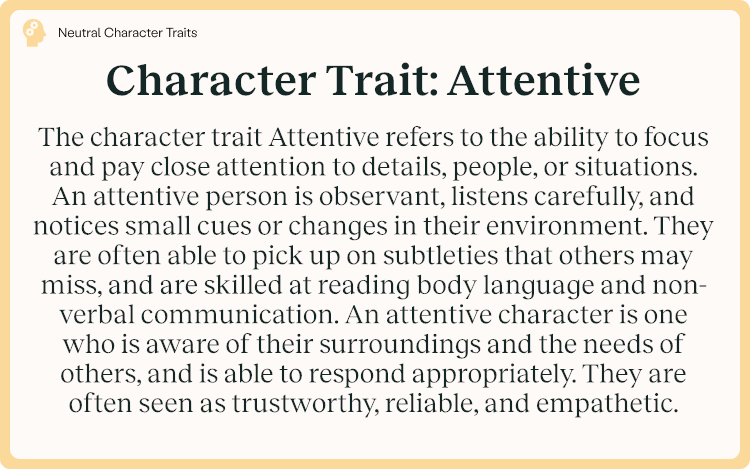
Attentive: Definition, Meaning, and Its Importance

In a world that often feels distracted and disconnected, the concept of being attentive has become increasingly significant. Being attentive means more than just paying attention; it embodies a deep awareness of the needs and concerns of others, showcasing a level of care and sensitivity. This article will explore the definition, meaning, and importance of attentiveness in various aspects of life, including relationships, communication, and the workplace.
Understanding what it means to be attentive can profoundly impact our interactions with others. From personal relationships to professional environments, the ability to show attentiveness can lead to healthier connections and more productive collaborations. Through this article, we will delve into the nuances of attentiveness, illustrating its vital role in fostering empathy, improving communication, and enhancing overall well-being.
Definition of Attentive
Being attentive refers to the ability to focus and be fully engaged in the moment, particularly in social interactions. It comprises a combination of observation, awareness, and consideration for others' feelings and needs. When someone is described as being attentive, they exhibit a level of mindfulness that allows them to respond appropriately to cues from others. This level of attentiveness can manifest in various forms, such as listening actively during conversations, recognizing emotional states, and demonstrating thoughtful gestures that acknowledge the efforts or struggles of those around them.
Meaning of Attentive
The meaning of attentive extends beyond mere observation; it implies a deeper commitment to understanding and supporting others. It entails a genuine curiosity about what someone is experiencing and an active engagement in providing help or encouragement. By embodying traits associated with being attentive, individuals can create a safe space for others to express themselves openly and without judgment. It is crucial in forming trusting relationships where individuals feel valued and appreciated.
The Importance of Being Attentive
The importance of being attentive cannot be overstated. In today's fast-paced society, attentiveness serves as a counterbalance to the distractions of electronic devices and the constant notifications that bombard our daily lives. When we prioritize being attentive, we cultivate meaningful connections, bolster emotional intelligence, and enhance our capacity for empathy.
Furthermore, being attentive contributes to our overall well-being. Research indicates that individuals who practice attentiveness often experience improved mental health outcomes, decreased stress levels, and greater satisfaction in their relationships. The act of being attentive fosters a sense of community and belonging, which is essential for personal and emotional growth.
How Attentiveness Impacts Relationships
Attentiveness plays a crucial role in the success of personal and professional relationships. When individuals are attentive to one another, they build a foundation of trust and understanding. This level of attentiveness allows for open communication, which is essential for resolving conflicts and fostering connection. People who feel heard and appreciated are more likely to reciprocate those feelings, creating a positive cycle of attentiveness.
- Strengthened Bonds: Genuine attentiveness can strengthen relationships by fostering emotional connections.
- Increased Trust: When one actively listens and responds to concerns, it builds trust and loyalty.
- Conflict Resolution: Being attentive enables individuals to address issues constructively rather than destructively.
The Role of Attentiveness in Communication
Effective communication relies heavily on attentiveness. An attentive communicator not only shares their thoughts but also actively listens to others. This two-way street of communication fosters a deeper understanding and appreciation of diverse perspectives. By being attentive during conversations, individuals can pick up on non-verbal cues, allowing for a more holistic understanding of the dialogue.
Active Listening
Active listening is a cornerstone of attentiveness. It involves fully concentrating on what is being said rather than merely waiting for one's turn to speak. Individuals who practice active listening exhibit traits indicative of being attentive, such as maintaining eye contact, nodding in acknowledgment, and asking clarifying questions. This not only validates the speaker but also enhances the overall quality of the conversation.
Ways to Cultivate Attentiveness
Cultivating attentiveness requires intentional practice. Below are some effective strategies to enhance one's level of attentiveness:
- Mindfulness Practices: Engage in mindfulness exercises such as meditation to improve concentration and awareness.
- Limit Distractions: Reduce or eliminate distractions during conversations, such as silencing phones or turning off electronic devices.
- Practice Empathy: Make a conscious effort to understand another person's perspective and emotions.
- Seek Feedback: Request constructive feedback from others regarding your level of attentiveness in conversations.
Attentiveness in the Workplace
In professional settings, attentiveness is crucial for fostering collaboration and ensuring strong team dynamics. Employees who display attentiveness not only enhance their relationships with colleagues but also contribute to a positive workplace culture that encourages mutual respect and open communication. When leaders exemplify attentiveness, they set the tone for their teams, promoting an environment where everyone feels valued and engaged.
Moreover, attentiveness in the workplace is vital for understanding client needs and providing exceptional customer service. Businesses that prioritize attentive interactions with clients are more likely to establish long-lasting relationships and build customer loyalty.
The Psychological Benefits of Being Attentive
Practicing attentiveness yields numerous psychological benefits. Individuals who engage in attentiveness tend to experience lower levels of stress and anxiety, as they become more present in their interactions. This mindfulness fosters a greater sense of control over their emotional responses and leads to improved emotional intelligence.
- Enhanced Self-Awareness: Attentiveness encourages individuals to reflect upon their thoughts and feelings.
- Improved Emotional Regulation: Being attentive allows individuals to manage their emotions better.
- Lower Stress Levels: Engaging fully in the moment can help alleviate feelings of stress and anxiety.
Conclusion
In conclusion, the concept of being attentive holds immense importance in various facets of life. From enhancing personal relationships to fostering effective communication and improving workplace dynamics, attentiveness serves as a fundamental building block for connection and understanding. By cultivating attentiveness, individuals can not only improve their interactions with others but also enhance their own emotional and psychological well-being. As we navigate a world filled with distractions, taking the time to be attentive is more crucial than ever, reminding us of the value of human connection and the power of compassion.
Did you find this article helpful? Attentive: Definition, Meaning, and Its Importance See more here Education.
Leave a Reply






Related posts